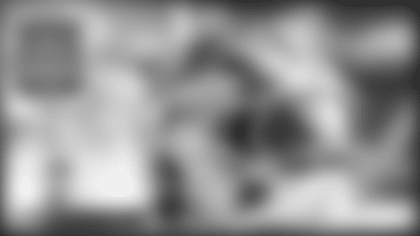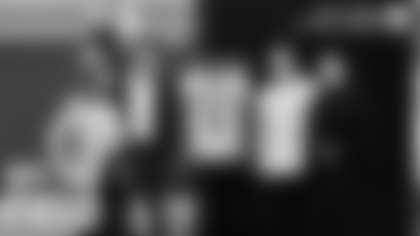If you ask Chilo Rachal about any of his 16 tattoos, the 49ers soft-spoken, bruising offensive lineman has a story for each one. All of them explain the major events of his life and further demonstrate his unique personality.
Take the University of Southern California logo on his right hand in between his thumb and pointer finger as an example. For Rachal, the 'SC logo is a constant reminder of the school he spent three seasons developing his craft and in his words, "Helped put me out in the spotlight. Once a Trojan, always a Trojan – that's why I have it."
Others like "Pancake City" on his left bicep represent what Rachal hopes one day will be what he's known for in the National Football League – knocking opposing players down to the ground if they get in his way.
But Rachal isn't trying to open a competitor to the International House of Pancakes.
He's simply looking to create an identity in the National Football League as a powerful offensive lineman, who dominates the opposition on a weekly basis and has fun while doing it.
"That's my trademark for my occupation," he joked. "I'll be introducing them [opposing defensive players] to the City."
As for his favorite ink design on his 6-foot-4 315-pound body, it would be the gorilla on his right forearm that is accompanied by the words "Beast Mode."
And if his rookie campaign was any indication of what's to come, the 49ers Faithful can look forward to Rachal becoming one of the nastiest offensive brutes in the league for years to come.
A year ago, Rachal was considered as one of the best offensive linemen prospects in all of college football after his junior season in Los Angeles. But he had to make the ultimate sacrifice by leaving USC a year early to enter the NFL Draft so he could help pay for his ailing mother's medical bills. The decision was tough for Rachal. He was on track to get a sociology degree. He left a lot of close friends and teammates behind and could have also improved his positioning in the draft.
But after he chose to forego his senior year, the 49ers added the talented offensive lineman to their roster in the second-round of last year's draft, envisioning him to be successful as a guard as well as having the potential to play at tackle down the road.
Initially, Rachal spent time at tackle during OTA's, before moving back inside at guard, where he played in college. But the beginning of his pro career wasn't too noteworthy. Rachal waited patiently for his chance to play while being behind several veterans in camp and during the first half of the season.
"It was very hard, because I came from a top university where I was playing a lot," he said. "To get here and have to sit in line, it was frustrating. It wasn't that I wasn't capable of doing it; I just had to learn how to be a pro. It took time to develop, but I worked hard at it and over time it paid off."
Rachal's time to play came midway through his rookie campaign, when Mike Singletary took over as the interim head coach of the 49ers. Early in his tenure, one of Singletary's first changes to the 49ers was to give Rachal his most significant playing time of his career on Monday Night Football against the Arizona Cardinals.

Without wasting any time at all, Rachal made the most of his opportunity, impressing the 49ers coaching staff right off the bat when subbing in at right guard midway through the second quarter.
"My first play in, I had a key block that sprung Frank [Gore]," he said.
But it wasn't just any kind of block, Rachal kicked out Cardinals linebacker Karlos Dansby, allowing Gore to burst free for a 20-yard run.
"It felt good, really good," Rachal said. "Coach Singletary gave me an opportunity and once I got that chance I took advantage of it," Rachal said. "I pulled around the corner, saw a red jersey and that was it."
After splitting time at right guard with veteran Tony Wragge for the Arizona game and the following week at home against St. Louis, Singletary rewarded the rookie, by naming him the starting right guard against the Dallas Cowboys.
"That showed that they believed in me," Rachal said. "Whenever your coaches believe in you, it makes you want to do your job that much better. Everyone was depending on me and I had to earn their trust and it took time to do that. But once I was in there doing it and with them believing in me – it brought out the best in me."
In his second career start, Rachal gave Bills defensive lineman Chris Kelsay a first-hand invitation to "Pancake City."
The hit was so powerful, Singletary watched it over-and-over on the team's chartered flight home from Buffalo after the 49ers 10-3 victory. The next day while speaking to the media during his Monday press conference, Singletary's rave review of Rachal's pancake-block spilled over.
"He had one block in the game that was just devastating," Singletary said to the writers and television crews. "I had to run it back over and over [on film] because I was really excited about it. I had to get up and go tell him about it.
"But even when I went back there on the plane, all the offensive linemen said, 'Coach, did you see that?' I said, 'Yes, I saw it.' They were excited about it as well."
Throughout Rachal's rookie campaign, Singletary spent time during and after practice encouraging his young offensive lineman. To Rachal, that was really an important factor in his development.
"It meant a lot. I have a Hall of Fame player, a great coach who has done it all, wanting me to get better," Rachal said. "He's gone to Pro Bowls, he's won the Super Bowl – he's done everything. For him to take the time to yell at me – it felt good. I'd be worried if he wasn't saying anything to me. I like it like when my coaches get on me for making mistakes."
Rachal's development was a big key in the 49ers ground game this season, which allowed Frank Gore to rush for over 1,000 yards for the third consecutive season, a first in the 63 years of 49ers football.
Rachal credited offensive line coach Chris Foerster for significantly aiding in his learning of the finer techniques associated with being a well-rounded performer in the NFL.
"He's showed me how to take proper pass sets," Rachal said. "He's helped me develop a lot as a player. I give him a lot of credit for helping me get on the field. I came here raw, but he taught me it's not about being big and strong. He taught me it's about the little things and how to trust my technique."
In college Rachal relied on being bigger and stronger than the opposition.
"The NFL is way more technical," he said. "In college, I developed bad habits. I got away with a lot of bad stuff. I was used to hitting people one time and them falling. Here, it's not like that. I had to hit and grab and lock on to get a good block. Everyone in the NFL is really talented."
Now that he has a firm understanding of the level of play needed in the NFL to compete with dominant defensive players – Rachal has one mission this upcoming offseason – get into full-on "Beast Mode."
"My goal this year is to workout harder than I've ever worked out before," he said with an intent look on his face. "I want to really master my craft. I really want to be a dominant player on a consistent basis. I'm going to do that."
Rachal believes it's only right to push himself harder than he's ever pushed before if he wants to help coach Singletary continue building on the 5-3 record the 49ers had in the second half of the season.
"It feels good that we started something here," he said. "Coach Singletary introduced us to something and that was winning. He taught us how to win, how to prepare and how to practice properly. Once everyone got on board with him, we started to get results by following him."
With that kind of attitude, it's only going to be a matter of time before Rachal shows the rest of the world what "Pancake City" is all about.
"Next year, I'm going to play my heart out and give it everything I have. I really want you to put that in the story and tell the fans thank you for believing in me too. Next season, I'm going to show them something – my worth."






